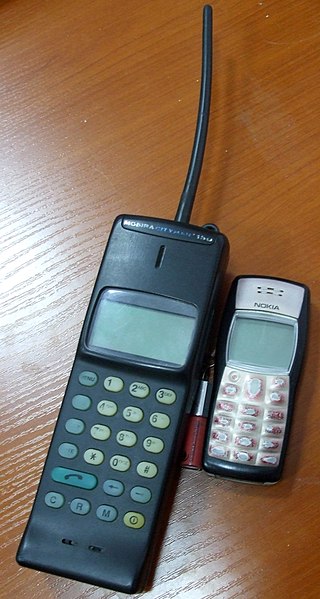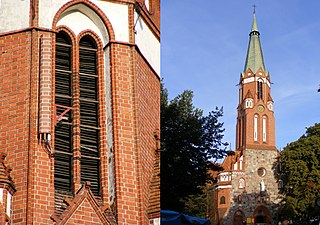
The Global System for Mobile Communications (GSM) is a standard developed by the European Telecommunications Standards Institute (ETSI) to describe the protocols for second-generation (2G) digital cellular networks used by mobile devices such as mobile phones and tablets. GSM is also a trade mark owned by the GSM Association. GSM may also refer to the Full Rate voice codec.

Nokia Corporation is a Finnish multinational telecommunications, information technology, and consumer electronics corporation, originally established as a pulp mill in 1865. Nokia's main headquarters are in Espoo, Finland, in the Helsinki metropolitan area, but the company's actual roots are in the Tampere region of Pirkanmaa. In 2020, Nokia employed approximately 92,000 people across over 100 countries, did business in more than 130 countries, and reported annual revenues of around €23 billion. Nokia is a public limited company listed on the Nasdaq Helsinki and New York Stock Exchange. It was the world's 415th-largest company measured by 2016 revenues, according to the Fortune Global 500, having peaked at 85th place in 2009. It is a component of the Euro Stoxx 50 stock market index.
The Universal Mobile Telecommunications System (UMTS) is a 3G mobile cellular system for networks based on the GSM standard. Developed and maintained by the 3GPP, UMTS is a component of the International Telecommunication Union IMT-2000 standard set and compares with the CDMA2000 standard set for networks based on the competing cdmaOne technology. UMTS uses wideband code-division multiple access (W-CDMA) radio access technology to offer greater spectral efficiency and bandwidth to mobile network operators.
Telecommunications in Yemen provides information about the telephone, Internet, radio, and television infrastructure in Yemen.
Telecommunications in Bahrain are provided by the Bahrain Telecommunications Company, trading as Batelco, as well as other companies such as Zain and Stc Bahrain.
Wireless local loop (WLL) is the use of a wireless communications link as the "last mile / first mile" connection for delivering plain old telephone service (POTS) or Internet access to telecommunications customers. Various types of WLL systems and technologies exist.
Yettel Hungary is the second largest mobile phone operator in Hungary. Yettel Hungary Ltd. was founded as Pannon GSM Telecommunications Ltd. in 1994.

NMT is an automatic cellular phone system specified by Nordic telecommunications administrations (PTTs) and opened for service on 1 October 1981. NMT is based on analogue technology and two variants exist: NMT-450 and NMT-900. The numbers indicate the frequency bands used. NMT-900 was introduced in 1986 and carries more channels than the older NMT-450 network.

Bahrain Telecommunication Company BSC, trading as Batelco, is the principal telecommunications company in Bahrain. The company's headquarters are in Bahrain and the company is listed on the Bahrain Bourse. The Chairman of the Board is Abdulla Bin Khalifa Al Khalifa.
GSM frequency bands or frequency ranges are the cellular frequencies designated by the ITU for the operation of GSM mobile phones and other mobile devices.
DX 200 is a digital switching platform currently developed by Nokia Networks.

Node B is the telecommunications node for mobile communication networks, namely those that adhere to the UMTS standard. The Node B provides the connection between mobile phones (UEs) and the wider telephone network. UMTS is the dominating 3G standard.
Siemens Communications was the communications and information business arm of German industrial conglomerate Siemens AG, until 2006. It was the largest division of Siemens, and had two business units – Mobile Networks and Fixed Networks; and Enterprise.
Nokia Networks is a multinational data networking and telecommunications equipment company headquartered in Espoo, Finland, and wholly owned subsidiary of Nokia Corporation. It started as a joint venture between Nokia of Finland and Siemens of Germany known as Nokia Siemens Networks.

Adtran, Inc., is an American Fiber Networking and Telecommunications company headquartered in Huntsville, Alabama. It was founded in 1985.
Network equipment providers (NEPs) – sometimes called telecommunications equipment manufacturers (TEMs) – sell products and services to communication service providers such as fixed or mobile operators as well as to enterprise customers. NEP technology allows for calls on mobile phones, Internet surfing, joining a conference calls, or watching video on demand through IPTV (internet protocol TV). The history of the NEPs goes back to the mid-19th century when the first telegraph networks were set up. Some of these players still exist today.
Vodacom Tanzania Limited is Tanzania's leading cellular network company. As of December 2020, Vodacom Tanzania had over 15.6 million customers and was the largest wireless telecommunications network in Tanzania. Vodacom Tanzania is the second telecom company in Africa, after Vodacom, to switch on its 3G High-Speed Downlink Packet Access (HSDPA) which was available only in Dar Es Salaam in early 2007.
In telecommunications, long-term evolution (LTE) is a standard for wireless broadband communication for mobile devices and data terminals, based on the GSM/EDGE and UMTS/HSPA standards. It improves on those standards' capacity and speed by using a different radio interface and core network improvements. LTE is the upgrade path for carriers with both GSM/UMTS networks and CDMA2000 networks. Because LTE frequencies and bands differ from country to country, only multi-band phones can use LTE in all countries where it is supported.

Mobile phone industry in Russia is a trade industry of cell phone devices and mobile network services in Russia. Since the collapse of the Soviet Union in the 1991 it had seen a great expansion over the last decades becoming one of the largest in the world. In terms of number of smartphone users, Russia is the 4th biggest smartphone market in the world sitting behind only China, India, and USA.
Cellular frequencies are the sets of frequency ranges within the ultra high frequency band that have been assigned for cellular-compatible mobile devices, such as mobile phones, to connect to cellular networks. Most mobile networks worldwide use portions of the radio frequency spectrum, allocated to the mobile service, for the transmission and reception of their signals. The particular bands may also be shared with other radiocommunication services, e.g. broadcasting service, and fixed service operation.







